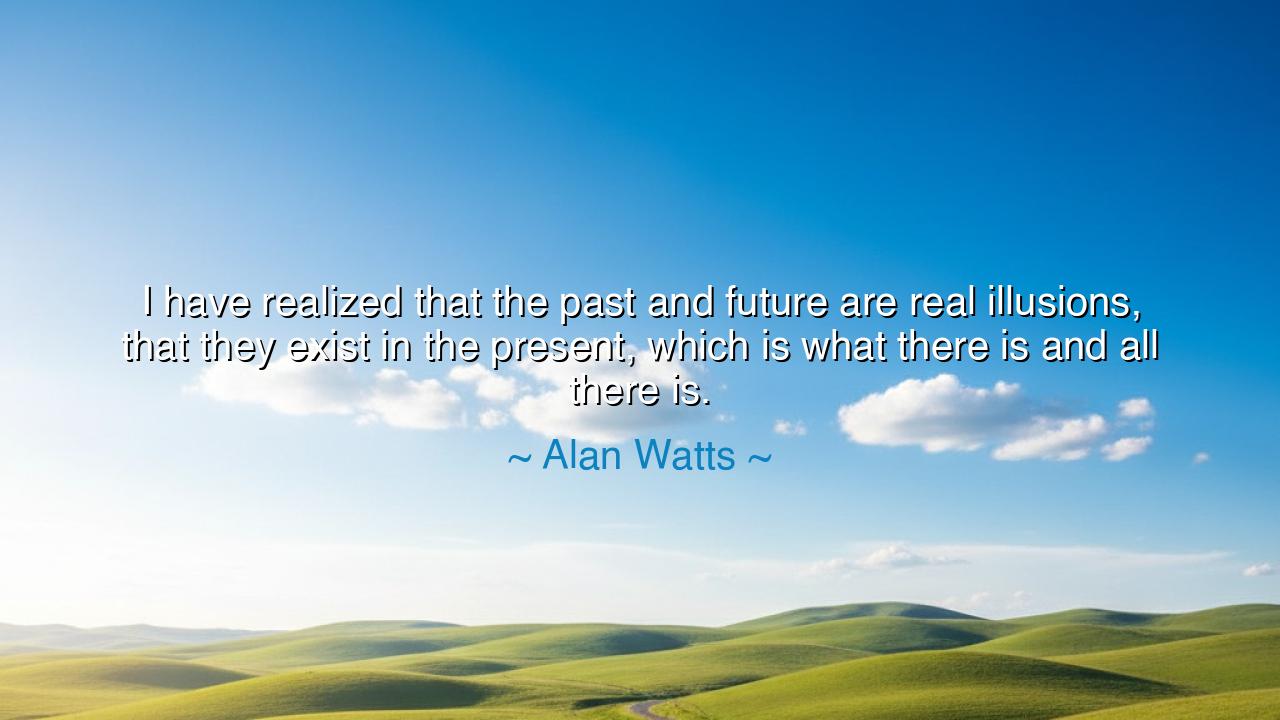
I have realized that the past and future are real illusions, that
I have realized that the past and future are real illusions, that they exist in the present, which is what there is and all there is.






In the immortal words of Alan Watts, "I have realized that the past and future are real illusions, that they exist in the present, which is what there is and all there is." These words cut through the veil of time, reminding us that what we perceive as the past and the future are mere constructs of our mind, and the only true reality is the present. The past is a collection of memories, distorted by the passage of time, and the future is but a realm of possibilities—both exist only in our imagination. Yet, the present is the moment in which we breathe, in which we experience life in its raw, unfiltered form. It is all that is real, all that is ever truly within our grasp.
Consider the great philosopher Heraclitus, who famously said, "You cannot step into the same river twice." His wisdom suggests that time, like a flowing river, is constantly changing, and we cannot hold onto the moments that have already passed. The past is like the river's waters—gone, never to return—and the future is the river yet to be traversed, uncertain and unknowable. But what is constant and undeniable is the flow of the present moment. Just as the river carries us forward, so too does time, ever-moving, ever-changing, leaving us with nothing but the water beneath our feet. It is in this flow that life unfolds, and it is in this flow that we must find meaning.
To illustrate this truth further, we can turn to the story of Gautama Buddha, who, in his quest for enlightenment, sought to transcend the cycle of birth, death, and rebirth. His journey was marked by the realization that all suffering arises from attachment to the past and future. Buddha's teachings emphasized the importance of mindfulness—of being fully present in each moment—because only by embracing the present can one free oneself from the eternal tug-of-war between what has been and what might be. It was through this awareness of the present that Buddha found the path to liberation, showing that true peace lies not in dwelling on the past or chasing the future, but in embracing the now.
In the philosophy of Stoicism, the great Roman sage Marcus Aurelius echoed similar sentiments, urging us to focus not on what has passed or what may come, but on the present. He wrote, "The present moment is all we have. The future is uncertain, and the past is gone." For the Stoics, the only real power lay in our actions in the present, for it is in the present that we possess the power to choose, to respond, and to shape our destiny. The past, with its regrets and triumphs, cannot be changed, and the future, with its anxieties and expectations, is not yet within our reach. The Stoics, therefore, cultivated the practice of living in the present as a means of achieving inner peace and mastering the chaos of the mind.
Watts' insight also brings to mind the ancient wisdom of the Native American concept of "walking in two worlds." For the Native peoples, this idea acknowledges the tension between the spiritual and the material, the past and the future, yet it emphasizes the importance of being fully present in the moment. To walk in two worlds is to honor the past, to honor the future, but never to allow them to steal the present from you. This wisdom reminds us that we, too, must walk in this world, in this moment, fully aware of its richness and beauty, without being shackled by the weight of time.
And yet, this truth remains elusive to many. We are often pulled by the force of time—either haunted by memories or driven by future ambitions. We forget that the only true reality is this moment, the one that we are living right now. The lesson here is profound: life is not something to be anticipated or revisited; it is something to be experienced in the present. We must embrace the now, for it is the only thing that we can truly influence, the only thing that is truly within our reach.
Therefore, let us take practical action in our lives: pause, breathe, and immerse ourselves in the present. When we feel the weight of the past or the future pressing upon us, we must remind ourselves that the present is the only true reality we can control. Just as the river carries us forward, let us flow with time, unburdened by regrets or fears, and find meaning in the ever-unfolding moment. Live fully now, for in the present, all of life’s beauty resides. Let go of the illusion of time, and you will find freedom.






AAdministratorAdministrator
Welcome, honored guests. Please leave a comment, we will respond soon